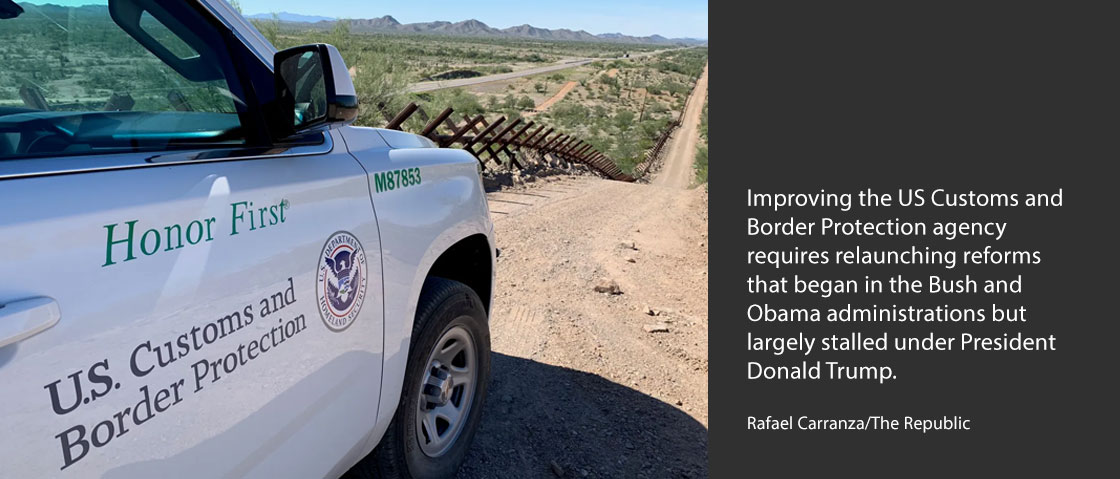Opinion: The Border Patrol needs reform, but it can't be a rigid, top-down approach. Here are 4 ways to make changes happen - and make them last. This article first appeared on AZCentral.com here.
The new leadership of US Customs and Border Protection (CBP), America’s largest law enforcement agency, faces daunting challenges.
In addition to managing a migrant crisis on the Southwest border in a polarized political environment, it must also ensure that its operating components live up to their potential as modern, professional law enforcement bodies.
Doing so will require relaunching a process of reform within one of those components, the Border Patrol, that began under the Bush and Obama administrations but was largely abandoned during the Trump administration.
Border Patrol faces unique challenges
The overwhelming majority of Border Patrol agents are honest, public servants faithful to the law and the Constitution. But like any law enforcement agency, the Patrol faces challenges to professional conduct.
These challenges are exacerbated by the Patrol’s unique circumstances. Agents confront well-financed smugglers constantly seeking to corrupt law enforcement. Many agents serve in the same border communities where they grew up, meaning that smuggling organizations may know agents and their families.
And the Patrol’s rapid growth – it has quadrupled in size since 1995 – has made it more difficult to comprehensively vet and oversee recruits.
And it was slower than some municipal police departments to introduce other 21st century accountability measures, such as vehicle cameras and locational tracking devices for agents. In addition, it has struggled to update procedures regarding the use of force, such as deescalation training and reporting.
Reform must come from the ground up
Until 2016, the Patrol had never released systematic information on use of force by its personnel. The Patrol made considerable progress in professionalization during the Bush and Obama years. Improved training of agents and expanded deployment of less lethal devices resulted in a significant reduction in firearms use between 2011 and 2016.
The Patrol was also the first federal law enforcement agency to pilot the use of body cameras. However, broad deployment of these devices to the field never occurred. Restarting the process of reform is essential.
But reform cannot be based on a rigidly top-down approach; its success depends crucially on building a coalition for change and true collaboration between political appointees and career officials.
1. Acknowledge that this job is unique
The first step in this direction is for political appointees at Customs and Border Protection to acknowledge that the Patrol is indeed unique. Its principal adversaries – transnational cartels, which now control most human smuggling – are far more menacing than the local gangs with which municipal law enforcement agencies contend.
Agents must apprehend large groups of border crossers without any knowledge of who they might be, sometimes in remote areas without reliable radio coverage, hours away from backup. And yet Border Patrol Agents cannot pick their battles or use their discretion when deciding whether to make an arrest; they must hold the line.
Under these circumstances, reform cannot simply follow the playbook used by progressive mayors and police chiefs.
2. Take agents' concerns seriously
In addition, Customs and Border Protection leaders must continue to seek out those chiefs and agents who are champions of reform. The Patrol is not a monolith. Many agents are sympathetic to accountability-enhancing reforms, and others can be brought along if political appointees demonstrate that they take agents’ concerns – and the Patrol’s mission – seriously.
3. Work to de-politicize border security
Customs and Border Protection’s new leadership must also work hard to de-politicize the issue of border security. In the post-9/11 world, people simply cannot be allowed to cross America’s borders just as they please, regardless of their identity or intentions.
It follows that the Patrol’s fundamental mission should enjoy support across the political spectrum. Equally important, agents must be portrayed as they are – honorable civil servants who enforce the law of the land – not targets for ritual pillory by advocacy groups or politicians pandering to them.
4. Go around the union if it won't support reform
Agency leaders must confront the sad fact that the National Border Patrol Council (the Patrol’s union) is unlikely to be an ally in any of these efforts. In the past, the union has opposed sensible anti-corruption efforts, attacked the Patrol’s own uniformed leaders and sullied its reputation by playing partisan politics.
Abolishing the union – as the Bush Administration seriously considered doing – is the best approach. But if that proves politically impossible, CBP’s leaders will have to find ways to work around or push past the union.
Finally, Customs and Border Protection leadership must enlist allies from outside the agency: Members of Congress and their staffs, senior Biden administration officials (including a well-versed secretary of Homeland Security), former appointees from both political parties, retired Border Patrol chiefs who command agents’ respect and outside experts who care deeply about the agency.
Given the deftness that reform requires, CBP’s leaders will need all the help they can get.
Josh Kussman is corporate counsel/Homeland and law enforcement executive of Avantus Federal. He was director of policy at Customs and Border Protection (CBP) during the Bush administration. Chappell Lawson is associate professor of political science at the Massachusetts Institute of Technology. He was executive director of policy at CBP during the Obama administration Reach them at jkussman@avantusfederal.com and clawson@mit.edu.




